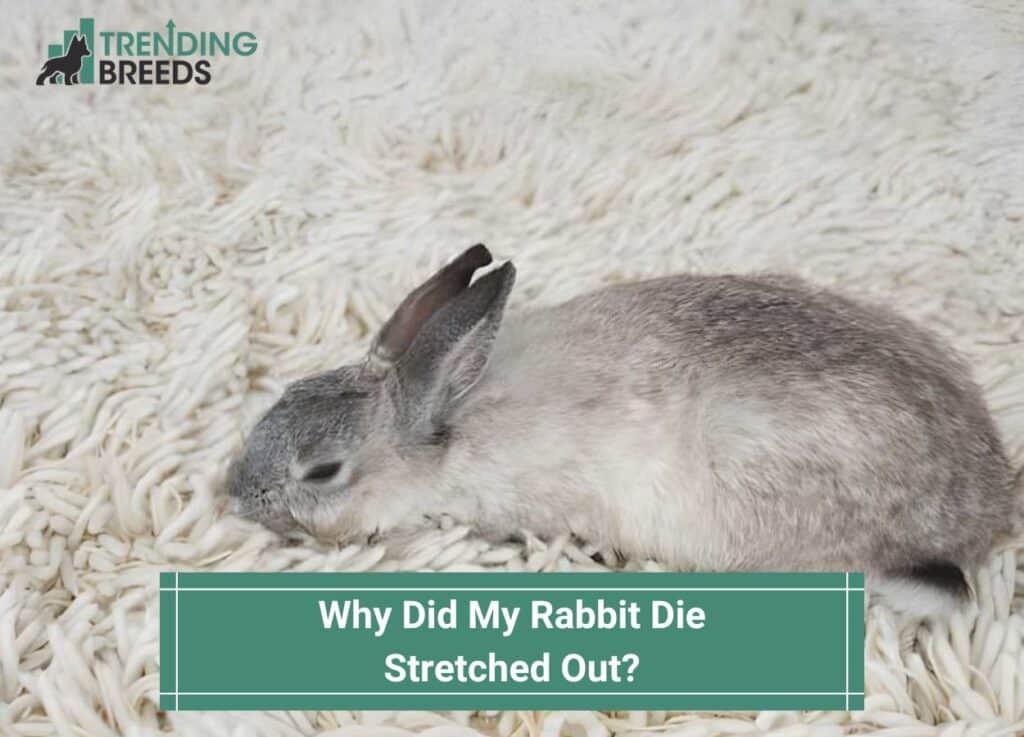
Finding your rabbit lifeless on the ground is heartbreaking. Most rabbit owners will be curious to know more about their rabbit’s cause of death. Did your rabbit die stretched out? You want answers!
Analyzing the rabbit’s physical condition at the moment of death is one way to do this. An issue that frequently arises is a stretched-out dead rabbit.
A stretched-out rabbit can pass away since this is a frequent method for animals to die. When in pain, rabbits stretch out in this pose and are frequently seen doing so in the wild. Many rabbits will die stretched out, whether from toxicity or old age.
There is rarely anything from which to conclude. It indicates that you need to look more closely to determine the precise reason why your rabbit perished.
Before we discuss this further, let’s look at some of the signs of a dying rabbit.
Other articles you would like: Best Rabbit Rescues and How Long Can Bunnies Go Without Food?
Table of Contents
Signs That a Rabbit is Dying
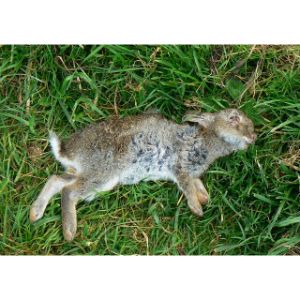
A rabbit is a vulnerable creature since it is small and timid. Rabbit deaths are frequently surprising and tend to occur without the most obvious indications. The lifespan of a rabbit is impacted by some uncontrolled factors.
They will experience a variety of inherited genetic ailments as they age. A sick rabbit is always torpid and turns down food and drink. Sometimes, they’ll have an increased sense of dread or competition.
Your rabbit’s life is in jeopardy if you notice changes in your breathing or breathing issues. The most frequent symptoms are discomfort and pain, combined with changes in behavior. Several of them have muscular spasms right before they pass away.
Rabbit Died Stretched Out: 6 Causes of Deaths
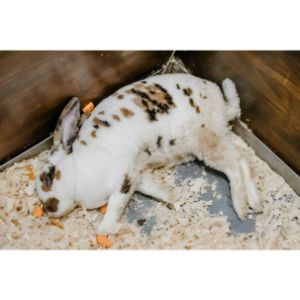
Rabbits often have body temperatures that range from 100 to 104 degrees Fahrenheit. Their heart rate should be between 180 and 250 beats per minute.
Changes in a rabbit’s vital signs indicate that it is ill or dying. So, it is important to know how they usually act and what signs they usually show of being sick or dying.
Here are several potential causes of sudden and prolonged death in rabbits.
Poisonous Materials
Rabbits consume daringly. They have the propensity to eat anything they feel is appropriate. These things might be the vegetation in your yard, garden, or any blooms that are near your residence.
These little creatures are fatally affected by insecticides, pesticides, and chemical compounds used to protect plant life.
Understanding a rabbit’s eating habits and what will and won’t work for them is essential.
Poisonous items include sharp objects, plants that have been exposed to pesticides, and inedible cloth that is lying around the house. In such a case, be sure to keep your pet out of the garden.
Fear or a Scary Environment
Rabbits are easily frightened. Screaming and other loud noises might scare them when they’re at home. They often wander, so being suddenly exposed to the outside terrifies them.
They will become so alarmed by seeing an animal outside that they risk having a heart attack.
A calm and peaceful environment is essential for your rabbit’s well-being. So, it’s also a good idea to keep rabbits away from children under 12 years old.
It’s because their health is affected by noisy environments and excessive gaming. The horrors of dogs, cats, and other animals are comparable.
Contact with Sharp Objects
If you own a rabbit, you may expect it to constantly wander around your house.
You must set aside time to put them in their enclosure, even if you keep them in a cage. They prefer to eat whatever is put in front of them, as we have already mentioned.
Therefore, it will be imperative to keep powerful, sharp objects like metal nails, glass, and plastic with sharp edges away from the rabbit’s point of contact. The rabbit may suffer bodily harm from these objects.
Also, because they have to chew so much, they are more likely to eat things that are sharp, small, and hard to digest.
Both of them have the potential to result in internal bleeding and often undetected mishaps. This hemorrhage might potentially contribute to their prolonged deaths.
Gastrointestinal Stasis

Rabbits often have gastrointestinal stasis, which weakens the immune system and makes it stop working in the long run. By building up gas in the rabbit’s stomach, this disease causes the animal to swell.
This condition can be brought on by internal obstructions as well as inactivity, stress, unbalanced nutrition, and bad weight loss plans.
The disease strikes the rabbit while it is young, but it won’t kill it until it is much older. Your rabbit is less likely to get GI stasis if it gets enough care, exercise, and food.
Fly Strike or Myiasis
When a fly deposits its eggs on a rabbit, terrible things happen. It happens because the eggs hatch quickly and turn into parasites that consume the rabbit from the inside out.
These insects are drawn to the bunnies’ unclean butts. Therefore, it’s crucial to comfort them when they defecate. As a precaution, you might keep fly protection close by while taking them outside. It helps to take them to routine vet appointments.
Even if a rabbit detects the contamination quickly, its lifespan will be reduced. The fly attack is thus one of the leading causes of unexpected and early deaths.
Old Age
Did your rabbit die stretched out? The root cause has to do with getting older. Depending on their habitat and breed, rabbits typically live between 5 and 8 years, however, they can live up to 12 years.
All animals will eventually experience old age, which is one of their characteristics. Your rabbits will naturally assume a stretched-out stance because of this.
A rabbit dying stretched out is not usually unnatural or something to worry about because it is a normal function.
How to Maintain Your Rabbit’s Wellness
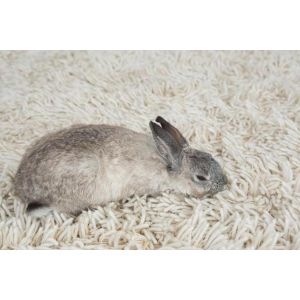
You must comprehend your rabbit’s wants if you want to keep them healthy and content throughout their lives.
Many domestic rabbits may live up to 12 years old, and the majority of them can easily reach the age of 8 years. Domestic rabbits have regular access to food and secure hiding spots, unlike wild rabbits, which are always under threat from predators.
Rabbit Breeds and Lifespan

There are several rabbit breeds, and the lifespan of all of these breeds varies. On average, purebred rabbits live shorter lifetimes than mixed breeds, as do bigger types compared to dwarf breeds.
A huge purebred rabbit, on the other hand, may live up to 10 years, but a dwarf mixed-breed rabbit may only survive for eight.
“Why did my rabbit die stretched out?” Well, it may be as simple as your rabbit having lived a full and happy life.
The Importance of Diet and Exercise
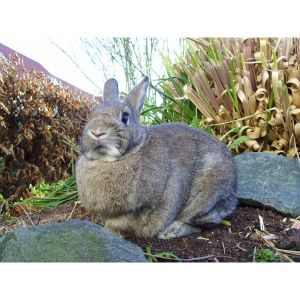
Your rabbit’s lifespan is more likely to be influenced by the food and activity you provide it than by heredity. People often think that rabbits are “low maintenance,” but they need a lot of activity every day and a certain diet to thrive.
To get enough exercise, rabbits require rather large cages and daily time spent outside. The American Rabbit Breeders Association recommends providing large rabbits with a cage that is at least 5 square feet in size.
Additionally, they should be given some time during the day to play and explore in a secure space so they can get some exercise. Lack of activity can cause obesity and cardiac issues, both of which can decrease your pet’s lifespan.
They also require a certain diet. Rabbits require continuous access to clean hay or dried grass since their teeth continue to develop throughout their lifetimes. Organic leafy greens and high-fiber pellets should also be added to their diet.
Carrots and fresh grass might be potentially harmful to your rabbit. They can harm their digestion since they contain too much sugar. Poor nutrition may make your pet sick as well as stressed out.
Advice on Taking Care of Your Rabbit

Why did my rabbit die stretched out? Maintaining your rabbit’s health involves more than simply making sure it gets food and exercise. Here are some additional suggestions to help your pet enjoy a long and fulfilling life.
Keep the Enclosure Tidy
Because rabbits may be untidy creatures, it’s crucial to keep their hutch tidy. Every day, remove excrement and dirty bedding, and at least once a week, thoroughly clean out their pen. Contagious infections can develop in dirty cages.
Neuter or Spay Your Rabbit
If they aren’t frequently bred, female rabbits that aren’t spayed are more prone to developing uterine tumors. To ensure your pet rabbits stay healthy, always spay or neuter them.
Locate a Small Animal Vet
Even though keeping rabbits as pets is rather popular, they are still frequently referred to as “small animals” or even “exotic” pets.
You might wish to look for a local veterinarian that specializes in rabbit care so your small fur baby can get the appropriate car he needs.
Common Diseases in Rabbits
If you’re asking why did my rabbit die stretched out, you may need to look at the possibility of disease. Even when given the finest care, rabbits can become ill. Early intervention is essential to your pet’s speedy and safe recovery from an illness. Here are some typical issues to be on the lookout for:
- Gastrointestinal (GI) stasis
- Dental disease
- Uterine tumors
- Head tilt
- Respiratory tract infections
Conclusion For “Why Did My Rabbit Die Stretched Out”
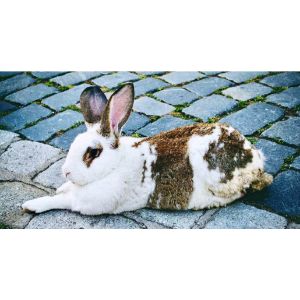
Our adorable little bunnies are tougher than we realize. They are also highly vulnerable, though. Rabbits are adorable, sociable pets for the home. They exhibit a few peculiarities, too. The first is the subject of this article.
So why did your rabbit die stretched out? Well, the position doesn’t necessarily signify anything; it’s just how these animals typically react. Two dead rabbits may be found spread out together, and each one may have passed away from one of two different causes.
You will also like:
If you want to learn more about rabbit deaths watch “Why Do Rabbits Die Suddenly? What Can You Do To Stop It From Happening?” down below:




